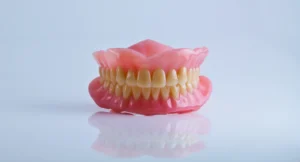Table of Contents
If you’ve lost a tooth, you’re likely dealing with more than just a gap in your smile. Tooth loss can lead to jawbone deterioration, as the bone no longer receives the stimulation it needs to stay strong. Without a replacement, nearby teeth may shift into the gap, affecting bite alignment, chewing, and even speaking. Dental implants offer a robust solution to prevent these issues.
What Are Dental Implants and How Do They Work?
So, what are implants, and why are they beneficial? Dental implants are titanium posts surgically placed into the jawbone, serving as artificial tooth roots. They fuse with the bone, providing a secure base for replacement teeth, such as crowns, bridges, or even dentures. Unlike traditional solutions, implants stimulate the jawbone when you chew, maintaining bone health and bite alignment. Whether you need a single implant or multiple, this solution offers a durable, natural-looking replacement that feels and functions like real teeth.
To qualify for dental implants, you’ll need healthy gums and enough bone structure to support the implant. Good oral hygiene and regular checkups are also essential to ensure long-term success.
The Benefits of Dental Implants
Opting for dental implants at Hardin Family Dental comes with numerous advantages:
- Preserve Jawbone Health: Implants prevent bone loss by providing the necessary stimulation to keep the jawbone healthy.
- Natural Look and Feel: Dental implants look and function like natural teeth, allowing you to smile, chew, and speak with confidence.
- Stability and Comfort: Implants don’t shift or move, unlike some traditional dentures, providing a secure and comfortable fit.
- Long-Term Investment: Implants offer a lasting solution, making them a cost-effective choice over time.
Dental Implant Process at Hardin Family Dental
Here’s an outline of what to expect during the dental implant procedure:
- Accessing the Jawbone: Our dentist will make a small incision in the gum to reach the jawbone.
- Preparing the Implant Site: A small space is created in the jawbone to anchor the implant.
- Inserting the Titanium Post: The titanium post is placed in the bone, acting as a stable foundation.
- Healing and Fusion: Over several months, the post naturally fuses with the bone in a process called osseointegration.
- Attaching the Abutment: Once the implant has fused, an abutment is attached to secure the final restoration.
- Healing the Gums: The gums are allowed to heal around the abutment.
- Creating and Placing the Restoration: An impression is taken to create a custom-made crown, bridge, or denture that matches your natural teeth, which is then secured on the implant.
This process typically takes a few months from start to finish, depending on your healing rate and the complexity of the case.
Cost of Dental Implants
The cost of dental implants varies based on several factors, including the number of implants, the type of restoration needed, and any preparatory procedures. While implants may seem costly upfront, their durability and oral health benefits make them a worthwhile investment.
Dental Implants vs. Traditional Dentures
Traditional dentures rest on the gums and may require adhesives, while dental implants are securely fixed in the jawbone, providing more stability and comfort. Additionally, implants help maintain jawbone structure, while dentures do not prevent bone loss.
By choosing dental implants, you’re not only enhancing your smile but also investing in your overall oral health, ensuring a stable, long-lasting solution for missing teeth.
If you’re ready to learn more about how dental implants can transform your smile, contact Hardin Family Dental today to schedule a consultation! Our team is here to provide the expert guidance and care you need to achieve a healthier, more confident smile.



